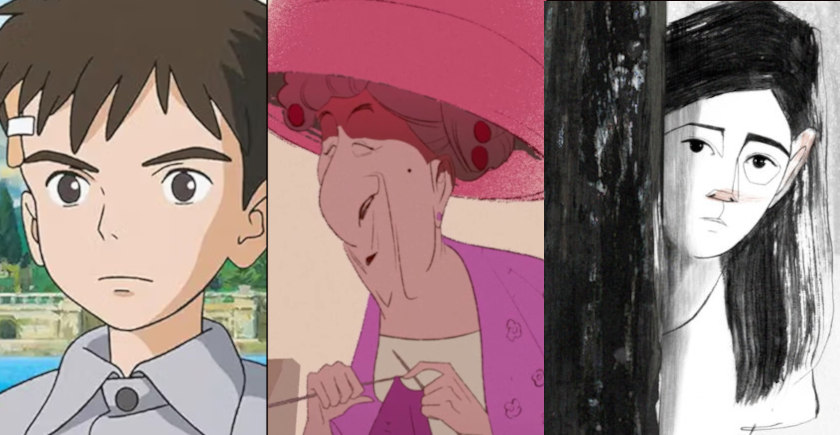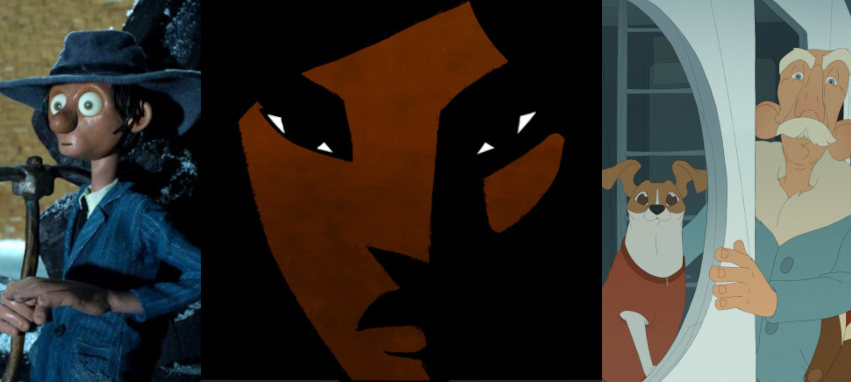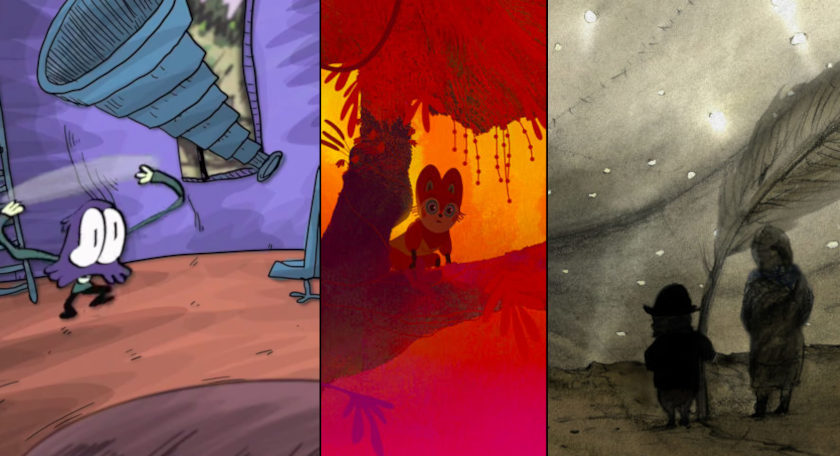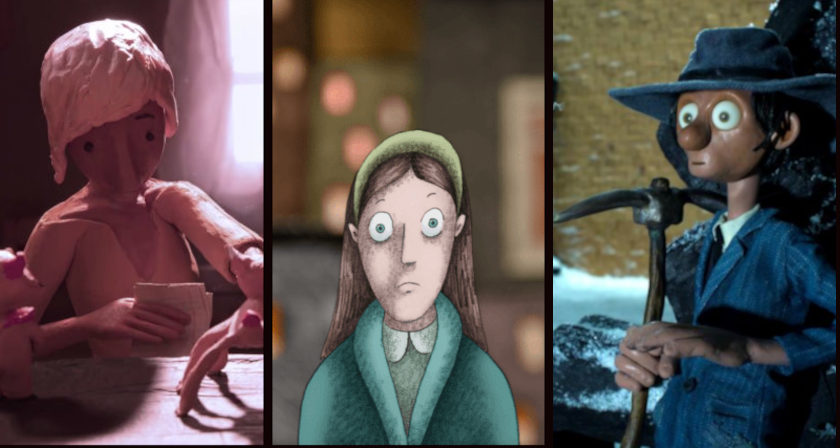Anca Damian Interview: Art Is Thinking Why We Are Alive (Indie Online 2020 Project)
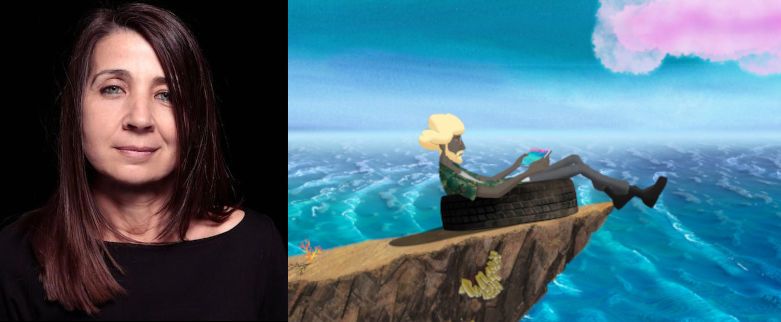
How do you navigate a world of altogether digital content as an animation professional? What are the opportunities and the mishaps that are awaiting for you in this all-inclusive, ever-penetrating online world? These were some of the questions that initiated the Indie Online 2020 Research project, headed by Michelle Kranot, and supported by The Animation Workshop / VIA University College, Center for Animation, Visualization and Digital Storytelling, Denmark. A more comprehensive overview of animation professionals and their attitude towards this during the (March) lockdown, their aspirations and decisions were also sought and recorded -before being qualified and quantified.
Within the framework of the project, Zippy Frames conducted a series of eight interviews with both acclaimed and emerging animation directors. Our first guest is Romanian animation director Anca Damian (Crulic, The Path to Beyond; The Magic Mountain; Marona, A Fantastic Tale)
VK: Let's turn back the clock to go to March 2020. Your feature animation project The Island was presented as project in production at CARTOON Movie, the last of the major animation events to take place physically.
AD: And now the film became a reality. When I started the movie, I put it in the near future. And the future just came quicker than I imagined. Everything has a particular fate and it was so connected with our lives.. I became like my main character Robinson Crusoe. I'm not just making films as a profession; I'm involved with my own life in doing films. This was exactly what happened with this film.
VK: What were the challenges you faced during the March lockdown?
AD: We had to deal with a lot during the lockdown. We tried to continue work remotely, even though we were in production already. As I am also a producer for my films, I take many risks. I entered the production without having the 100% financing at place, which usually is not the case. I still had a gap and obviously became a slower process to put it into place during the pandemic.
This crazy, unimaginable kind of film and musical was so difficult to finance, only at the script level. So, our only chance to do it was to just start doing it. I had a very good response in Cartoon Movie from sales agents and distributors; we also signed for the Benelux territories with Periscoop Film just during the lockdown; they liked the film and they were quite courageous despite the lockdown situation.
I lived as a woman during the Communist times in Romania, and I always had to struggle. I am the only woman animation feature director in Romania; and now I'm the only animation feature director worldwide who did four long features. So I always had to struggle.
VK: How did you manage in practical terms this time?
AD: I can work efficiently because I always have smaller groups, in different countries, and of course have to put a lot of energy to stay connected with everyone. I have to travel between these groups. I didn't invent ubiquity; I cannot be at different places at the same time. But if I have to be from time to time with my team members in the same space to talk and exchange ideas, I'd do it.
For Marona's Fantastic Tale, I had two production places in France, one in Arles (TuNouZaPasVU-Marc Rius), and a second one in Bordeaux (Marmita Film Emmanuel Quillet), 2 places in Belgium, and one in Romania. I had to coordinate all these things in Romania, France and Belgium. I work without assistant and production coordinator. Locally, Marc Rius and Emmanuel Quillet were really helping me. For The Island, I had a small production team in Romania. A part of production was made in Lille (France), and they are now finished, but also animators that worked remotely in France, and the compositing in Strasbourg, and also animators in Belgium. And I use Paris as a travel focus point between the various places. In The Island, the animation is much more complex, and the budget much more smaller (1,5M EUR).
Fortunately, I have Amopix in Strasbourg for the final stage to assemble and composite elements, with the very helpful Matthieu Rollin as the producer. But, apart from the production heads and studio people, I don't have any production coordinator or assistants involved in either of these two films (Marona and The Island). So, I need to visit the different groups all the time. Everything is building in a different creative way then; we have a different communication and energy while we are together.
VK: So you already had the experience of doing a lot of creative tasks and producing tasks by yourself. But now it's getting one step further with The Island production, and an even bigger one with the covid-19 outbreak.
AD: It gets much more complicated. This is the story and the fate of this film, doing and being alone. For my next film, I will definitely not repeat the Island because I expanded myself in a way that I cannot do that anymore. The project reveals itself in such a particular way, and this was the only way for this film to be produced. It was fate. We got Eurimages funding (but a smaller amount than what we asked, and less that would give us the comfort to continue. We just had to struggle, and I put a lot of my own money now to finish it.
In my talks with sales agents and distributors, I noticed they couldn't imagine how the finished film would look like. It blends visuals with both the musical element and the storyline advancing in a different way than they are used to see. And if you start describing an image, you are lost in details; only the image speaks for itself. What I showed at CARTOON Movie is only from the film's beginning. The imagery in the film is fantastic; I even see people who work on animation that they can't imagine the finished visuals.
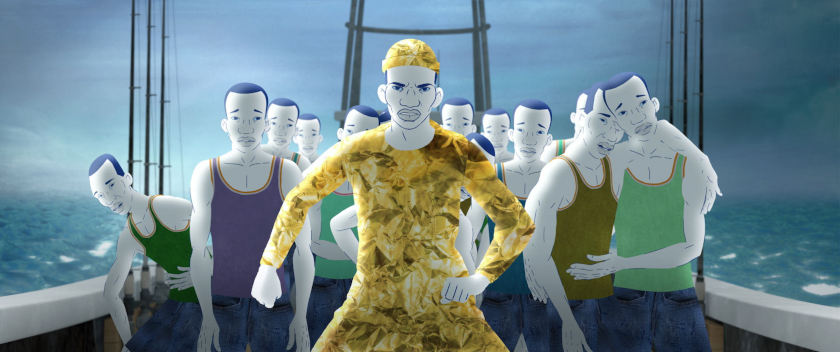
The Island
VK: So with all this stuff out, the lockdown and the pandemic actually helped the creative process.
AD: No, it didn't. In a way, it was part of the faith I had in the project. But I did notice how people were behaving. This lockdown pandemic divided the people into two groups; one group developed a kind of thinking on what is important, what is the meaning of what we are doing, what we should do; it became even more concerned about where we put our energy in, and what we should change. Another part of people freaked out; they were stuck, blocked, unable to function artistically. They thought that if we do one thing or the other, the pandemic will end, and we will then go back to normal.
And all this without seeing the big picture everything that you change, it's changing everything; and you should be active in putting energy to organize the future. You also need to be aware; there's a lot of censorship around. As I lived in a former Communist country, I started to be aware of a lot of dictatorship habits that entered our society. And I don't want to go back there to this Orwell society; I already lived once during the Romanian Socialist times. There are many ideas on the Internet spread by users. Who can tell what is fake news and what is truth? And who can censor this?
VK: I saw a lot of meme sets during the lockdown about which jobs are the most im portant; doctors were up in front during the pandemic, but artists were the least important ones. This was really curious, because we are fed with artists' stories (music, films, books etc.) during that time.
AD: Doctors help you survive, but art helps you live and understand the meaning of life, tells you why we are living. And I'm talking about art, not entertainment. Art should also be entertaining, of course, but it's not entertainment. We just don't go out to see a film or a theatrical play to have fun. What do we get from art is the meanings of why we are born, and where we are going.
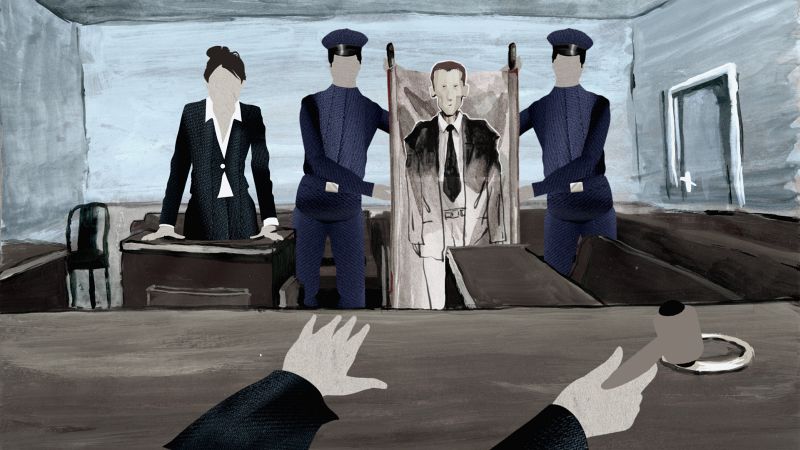
Crulic, The Path to Beyond
VK: Do you feel that this online content availability actually contributed a lot more to the art as entertainment business?
AD: It is a huge danger that art stays only as entertainment. I remember seeing this Facebook profile frame "support art workers" that a lot of artists put in their profile. Art is more than work, art is creation. It is a vision, it is thinking why we are alive. And we have to protect the films that celebrate those ideas this kind of film will disappear if we don't give them a chance.
Speaking also about the dictatorship and the artists, Stalin killed a lot of artists without caring; also, in Romania, we also start to forget. And we're now going to repeat the history soon if we don't understand that; how many people stand for their ideas? We should group together and state that art is not only entertainment. Of course, you seem to entertain people, but you want to give them a meaning, to make them think about the bigger picture, about the meaning of life through a piece of art that also contains elements of entertainment.
VK: But how can we impose our own ideas or comments in the bigger platforms (Facebook, YouTube) and smaller platforms, and not let them impose their own ideas of what is right and what is wrong?
AD: Talking about author censorship, as a white person you can't speak about races but if you're a black person, you can. Why? I am profoundly humanitarian, and I'm always on the side of the poor and the exploited people. But this kind of fence that they put in front of what I should speak about, and how should I talk, and what should I mean... I don't feel anymore as a free individual artist who can express profound things about humanity; I should censor everything on the way to the audience.
VK: We're probably going to live with this kind of situation for a long time. Is there any way for the artist, if not to benefit, at least, mitigate those kinds of circumstances? And what is the role of the festivals in this process related to the big social media platforms?
AD: I feel that the passive reaction in these times is a losing position. We should not be passive; we should share, but we should also organize new ways of communication. The big platforms are going to organize the society themselves, and we will not have any more space left to do it later. So this is the time that we should think forward, and communicate things in a proper way. The cultural level is important: when you see the bloggers and the level of the social media influencers, you say, 'Oh my god, where are we? Where is the meaning of life?' These have become the tools of the marketing now, and we should organize for ourselves also a place in the visual world.
Luckily in France the cinemas are (were) open. And I saw a lot of films in the cinema during this time, and the impression of the cinema hall can't be compared to any home screening. Still, we'll have a possibility to show them online and to communicate about them online. And we should really try to find our channels to do it. But the sooner, the better. Not to be stuck in.
VK: Who are the natural allies of the filmmakers? The festivals?
AD: Yes. I was in Venice this year. And even if it was a strange event with everyone putting their masks on (you didn't recognize people on the stage), I was so happy that it is something real. I said no matter how it is, I will handle this. But I remember there were people looking at the audience instead of looking at the film who took out their mask and who didn’t . You were yourself being watched instead of watching the screening. Even though the festival went on without problems, I felt in a way that we became monitored as festivalgoers, and checked.
VK: Still, it looked very humble to me. From the selection program itself, back to the jurors to the actual taking place of the festival, it celebrated the artistic identity instead of premieres and the red carpets.
AD: Yes, it's true. I was looking at the Cannes Label, a gift given to 4 animated feature films; they were very generous this year. I feel that the festivals now are thinking "Oh my God, we should really be more art focused, and not have actors' events, and big premieres and big studios'. In recent years, the space for artistic films at the festivals were becoming smaller and smaller. They now let more of these kind of films in their programme.
VK: Do you actually think that we should expect more artistic independent feature films in the festivals? And what would be their distribution place, the VOD platforms?
AD: Festival labels (Venice, Cannes, Berlin, San Sebastian, Locarno) still put the attention on the films themselves. All the commercial films will find their place in the market. The big problem is the money that you get from the cinema halls. Cinema hall admissions for big budget films ensured so far a revenue that also benefited European cinema. Still, with the American films now absent, a lot of French and European films got a bigger exposure on the market. I think that Josep by Aurel had 100,000 admissions in two weeks it did better than I Lost My Body by Jérémy Clapin last year. But one of the reasons was, of course, the available space on the market, which is now much bigger.
VK: What happened with Marona's Fantastic Tale admission numbers?
AD: Marona was released in France in the beginning of 2020, and in Belgium in February. It should have been released in Spain, just before the March lockdown but it was finally released in June, after the lockdown. It was also released virtually in the US by GKIDS and it will be released as a DVD. The English dubbed version is also to be released when cinemas are open again. It showed in Japan, Korea and Poland now also in The Netherlands.
VK: So did you actually get the audience response you wanted with Marona's Fantastic Tale? Or perhaps the lockdown and the pandemic went against this?
AD: It's interesting, because I got brilliant and huge press reviews from the US press. At a normal time, when critics would run from one event to the other, the response would not be so obvious. But I was really amazed at the response of the critics. They were really pointing out the beauty, the qualities and the humanity of the film. I didn't expect that: US critics look out more for standardized animation offerings. I also got brilliant reviews in France, but storywise the US critics were much closer to the heart of the film. In Japan, it also had a good response and also in Korea as well. But I think that in these countries the turnout would have been the same even without the covid-19 situation.
The US response was a surprise to me, for only the original French version with English subtitles was shown which necessarily restricts the number of the audience. Those who loved Marona got emotionally engaged with film, as judged by their reactions afterwards. It also went to a huge number of festivals (in the last two weeks, it got 7 prizes in Portugal, Germany and Czech Republic).
VK: How is the current landscape in terms of film funding?
AD: We navigate in a more dangerous landscape. I lost two fundings that I had aimed for, because their 'envelope' and budget became smaller; and they prioritized French majority (instead of French minority) co-productions. I asked for a small amount of money, but their budget was still small. I have to handle an industry that also reduces the funds available (which are also dependent in turn on cinema admissions). In Romania, there is a big problem now. Luckily, my next feature Starseed (more mainstream than The Island, and addressed to a bigger audience) is already financed by the Romanian CNC. But there's a huge problem this year; no 2020 calls for films were issued, and also the tax shelter scheme stopped.
Romanian politicians don't care about the culture. It's a strange thing: Romania is known internationally and culturally because of its cinema and artists, not because of the politicians' own cultural initiatives. What I learnt from them is that if you have a financing / funding issue and you don't go yourself to the Prime Minister to get it solved, your problem will never be solved. The Minister of Culture may have the best intentions, but not the power to solve your problem. The Romanian CNC Fund is collecting money from cinema admissions. It should have collected money from the lottery, but the Ministry of Finance still hasn't signed an executive order that defines the means to do this. So, for two years in a row, the law has still not been implemented. They don't dare take money from Internet providers; on the other hand, advertisers’ revenues for film collected was very low this year. So, they couldn't organize any call, and they can hardly give money to films that already got financed in the previous calls. And I don't see any solution for next year.
I now have to deliver the film in two years, and I only now have been able to start looking for co-producers. The Romanian CNC don't care if the animation film is short or feature length. There is a single animation section, to apply with either a short or a feature film and you can get the same amount for either. I got the same amount for my feature film other people get for their shorts. In a way, this is the reason I have to find funding elsewhere. I like the French system with its opportunities, even if the competition is rather strong (lot of quality artists and fine projects). But you do have a lot of options. In Romania, if the CNC is closed, you have no other option.
The Romanian cinema of auteurs still exists, and they still shoot feature films (Cristi Puiu,Cristian Mungiu, Corneliu Porumboiu, Radu Jude), but I don't know what will happen in two years from now. Some of them, like Radu Jude, changed their stories to take place during the pandemic to accommodate all these new rules. With all these masks, he can dub anyone now, there is no problem anymore [she laughs].
VK: Where do you imagine your films would screen in two years from now? VOD or cinemas? And how would you like your own films to be viewed? Imagine that in two years from now, a hashtag with Robinson Crusoe finds your film there, The Island, among other stuff.
AD: I think that cinema halls will stay and will become even more precious for cinema arthouse goers. But obviously, it won't be the main way to see films. Perhaps people will install their own, hall cinema systems.
My films will definitely need the festivals; I feel now that festival directors realize the importance of their own festivals and get themselves to a group, not being a competition mong festivals. Two days ago, I saw at the cinemas the new, Cannes-labeled film Drunk by Thomas Vinterberg, a brilliant philosophical tale about a loser who becomes a gainer. And I said to myself, where would this kind of film be seen? Of course, it might have an Internet audience, but you are lost on the Internet; there's so much stupidity, so much garbage. Anyone can do anything and put stupid things as influencers etc. This is a tool for communicating, and you have a great audience to spread bullshit.
I think avant-garde artists should be protected; protect the idea and the concept of what they're doing and thinking. My own films have changed throughout the times, from Marona to The Island and then to the Starseeed.
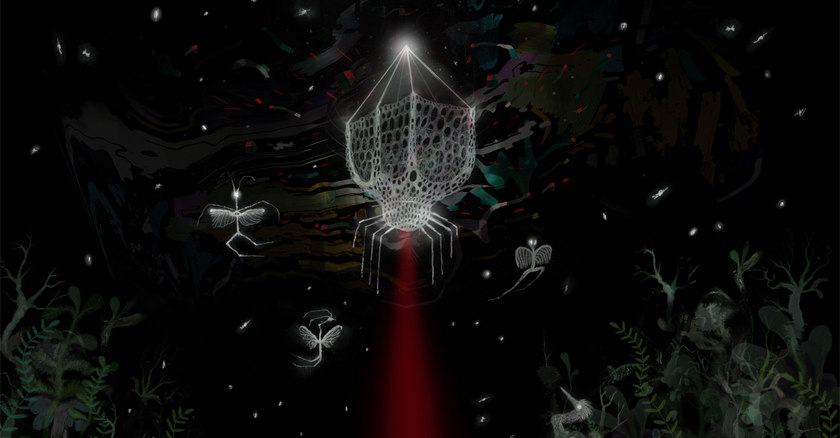
Starseed, Anca Damian
I'm living in contemporaneity, and I shape my ideas and my vision on what is important to tell. But for me, it is important to spread it in the right way. A film is an amplifier: what is in your head gets projected on the screen, and enters the head of the audience.
So, we should be very careful on what is projected on the screen. In Giuseppe Tornatore's film Stano Tutti Bene (1990), Marcello Mastroianni plays a 74-year-old Sicilian father who's visiting his sons and daughters. His daughter leaves him alone to take care of her small son, who's hooked on to television; when he can't watch television, he cries - so the TV set is open all the time. Suddenly there's a problem with the TV broadcast, and Mastroianni needs to stop the child from crying. So, he puts the laundry in the washing machine; the boy looks at the laundry spinning, and he stops crying. My own impression is that we are too watching the laundry in the washing machine.
About Anca Damian
Anca Damian studied at the Academy of Theatre and Film Arts where she obtained a diploma in Cinematography and a Doctor’s degree in Arts, Cinema and Media. After graduating, she worked as a director, screenwriter and producer for several documentaries on art related topics. shorts. In 2011, her second feature as Director, screenwriter and producer, “Crulic – The Path to Beyond” was screened at Locarno, Telluride among other 250 festivals, getting the Cristal for Best Feature Film at Annecy Film Festival 2012, and 35 other international prizes.
In 2015, her second animated feature “The Magic Mountain” won 11 international prizes, and the first to receive the Eurimages Audentia award for women directors. Her latest animation feature, "Marona's Fantastic Tale" was nominated at the European Film Awards, and was selected at Tokyo IFF and Rotterdam IFF, winning prizes in Tokyo, Bucheon (Korea) and Los Angeles, among others.
The interview was conducted October 2020 (interviewer Vassilis Kroustallis). It is part of the Indie Online 2020 research project, headed by Michelle Kranot and supported by The Animation Workshop / VIA University College, Center for Animation, Visualization and Digital Storytelling, Denmark.Viborg,




